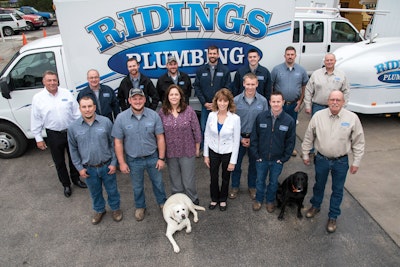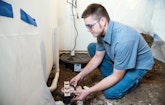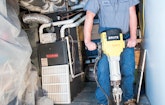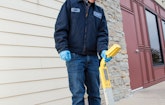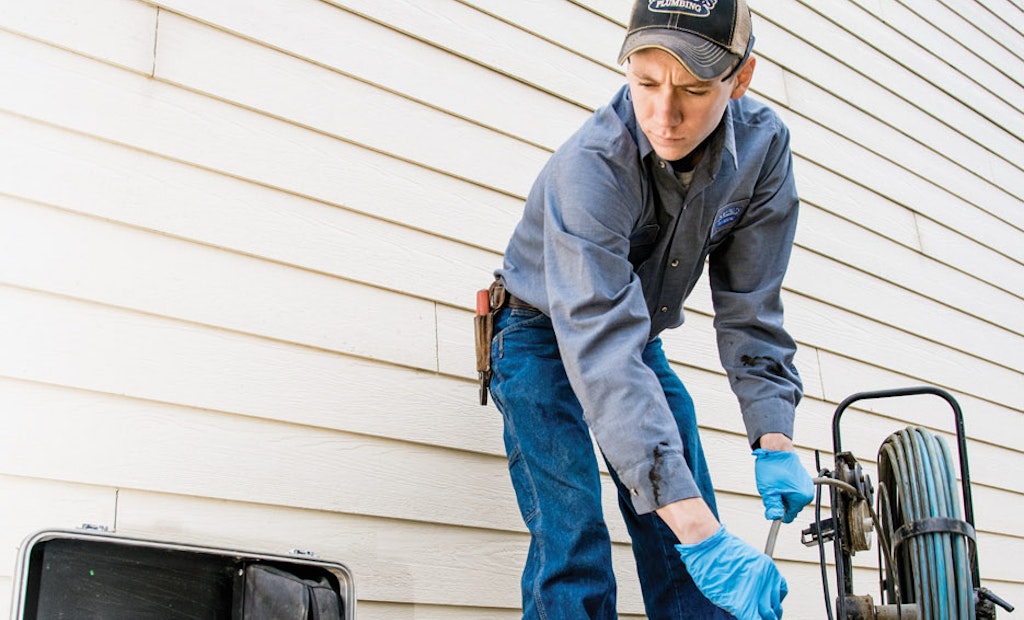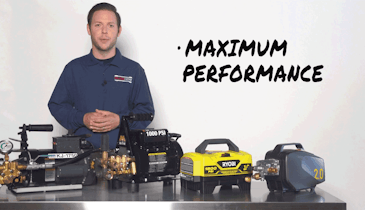Interested in Plumbing?
Get Plumbing articles, news and videos right in your inbox! Sign up now.
Plumbing + Get AlertsJohn Ridings was looking for the right opportunity to expand his business when a local sewer and drain cleaning company shut its doors. The situation was ideal, and Ridings immediately began preparing to step into the opening.
“It generated some quick revenue for us,” he says. “When you are focused on new construction and remodeling, your payment is typically every 30 days. With sewer cleaning, you get the check when you leave the job. This immediately helped us with cash flow. It also helped us become the No. 1 sewer cleaning company in the city.”
That was in 2001, five years after he started Ridings Plumbing in Springfield, Illinois. In the early years, the company focused on basic plumbing repair, and new residential and light commercial construction. Business was good, but adding sewer cleaning made it better.
“We started out with four sewer machines, and soon bought a small jetter,” Ridings says. “Then we purchased a bigger jetter, and word got around town that we did that work. It continued to grow, and now we have two trailer jetters from Spartan Tool.”
In the beginning
Prior to starting his business, Ridings spent two decades working for other companies — eight of those years were in management, so he had accumulated a lot of knowledge to bring to his own enterprise.
Ridings aimed for a highly successful startup, purchasing a 5,000-square-foot building and renting out a portion in order to cover the payments. That allowed him to set his own funds aside for a healthy investment in trucks, equipment and all the necessary tools. Ridings started with a single employee, but thanks to a surge of new construction at that time, he was up to six employees less than a year into the business.
Today, Ridings has 16 employees, and new construction now makes up only about one-third of the workload. Remodeling projects make up another third of the work and the remaining third comes from residential plumbing repairs and sewer cleaning.
The company’s equipment fleet includes 13 vans — mostly GMC and Chevrolet — three of which are set up for full-time service inspection capabilities with cameras from UEMSI - HTV. The company also has a John Deere backhoe, a JCB mini-excavator, trenchers from Ditch Witch, and two Spartan trailer jetters (4,000 psi/18 gpm and 3,000 psi/15 gpm).
Comprehensive approach
Investing in jetting equipment has been a good approach for Ridings Plumbing. There are many older homes in Springfield with concrete tile and clay tile sewers, and root growth is a chronic problem.
“We charge $400 to bring the jetter out and put it in the line, and then $200 for the camera,” Ridings says. “If the customer has us jet the line and use the camera, we will give a $100 deduction. That way, we can guarantee the work for a year. We find our customers very receptive to this pricing. While we have competitors who will offer to snake a line for $100 to $150, people seem to realize that this will just poke a hole in the stoppage and not actually clean the line. Once you jet the line and put in the camera, you can show the customer how cleaning the sewer benefits. They are very happy.”
Ridings Plumbing also teams up with RootX to provide customers a comprehensive fix to root issues.
“Whenever we apply RootX to the customer’s sewer, we register them with RootX. A year later, RootX will notify the customer it is time to have another treatment scheduled,” Ridings says. “We have used RootX for about three years. We have a lot of our customers on the RootX program for tree roots.”
A good team
Ridings’ team of employees has been another key to the company’s success. In fact, his staff is so dependable that Ridings and wife, Joyce, a retired school teacher, regularly take trips in their motor home, leaving the day-to-day operations entirely on the employees for periods of time.
Ridings says what gives him the most satisfaction is hearing from customers who write a note praising his employees’ performance, something that occurs often. “I get a note like this at least once a week,” he says. “I’ve got great people.”
That’s because Ridings has been particular about his hiring practices. Potential candidates come to him through a process of referrals. He never places job advertisements.
“If I’m looking to hire, I will put out feelers to the wholesale people to be on the lookout for someone. Or I’ll have someone mention a good candidate and go from there,” Ridings says. “When I bring in a young person, I will say that if he just wants a job, I’m not hiring. If you want a career, I’ll teach you a career. The thing I ask in return, after I get you through a four-year state apprenticeship and your state license, is that you stay with us for another four years to pay back the company for what we have trained you. It is a gentlemen’s agreement. We could write a contract, but we don’t do that. For the first two years with us we give direct supervision, and then for the last two years, we give partial supervision. So we do ask for that in return for what they have attained.”
But Ridings also takes steps to ensure employees don’t want to leave once they reach that four-year mark with the company.
“We are a support team here, and we take care of our people by offering medical and dental, paid vacation and paid holidays, plus a retirement program. Once we have people working for us, we don’t see much turnover. When they come to Ridings, they come to stay.”
He says he is a boss who sticks to the philosophy of treating others as you want to be treated.
“I don’t want to rant and scream at somebody,” he says. “If there is an issue with a couple guys, I’ll take them into a private meeting and give each five minutes to state their case. We will work things out. Sometimes there are personal crises. We want to be a support team here at Ridings.”
Going forward
Ridings says he wants to continue expanding his company as the right opportunities come along. One such chance presented itself about a year ago.
“A one-man, 60-year-old plumbing shop was going out of business, and the owner offered the firm to me,” Ridings says. “He had about 1,200 customers, and I bought some of his inventory — his truck and tools. We are averaging 20 to 25 calls a month from his customers. As they use us, we find they are telling friends and family, and that is a pretty good way to grow a little. That owner actually approached me and said that he had heard good things about our company and hoped we could help each other out. It worked. It was affordable.”
However, Ridings decided another recent opportunity wasn’t the right move. “There was another opportunity for an acquisition, a turnkey plumbing and HVAC operation, but it was about 100 miles away. That was farther than I wanted to go.”
Expansion opportunities aside, Ridings says that after 41 years working in the industry, he still enjoys going to work every day and is pleased to have such a great staff. His goal is to simply continue running his company, enjoy the fruits of his efforts, and be sure his key people will be able to carry on the Ridings tradition long into the future.
The responsibility of ownership
John Ridings has experienced the plumbing business both as an employee and an owner. There are some distinct differences between the two perspectives.
“I’ve been doing this for 41 years — 21 in my own business,” he says. “Probably the most stressful thing when you are the owner is doing the work, and dealing with contracts and bills that are coming in that you want to pay on time while still ensuring you take care of your employees. My people have never missed a Friday paycheck.”
One thing that has helped is having a good bank behind the business to keep the cash flow going, even during tough times. Ridings says, “In 2009, when the economy tanked, our business dropped 40 percent in one year. Because I had a good bank and lots of equity in the things I owned, I was able to get money out and keep the business going. The most important thing for a small business is to have a good credit line and a banker to work with — most definitely the most important thing.”
